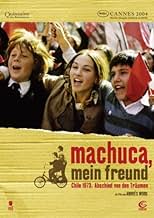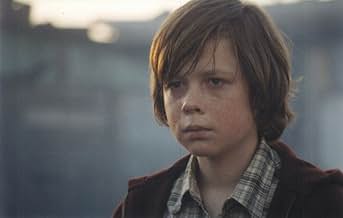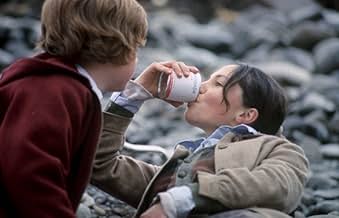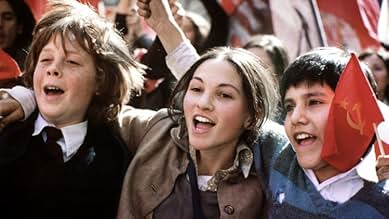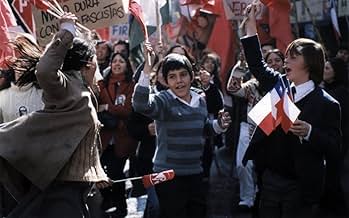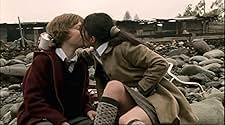VALUTAZIONE IMDb
7,7/10
12.955
LA TUA VALUTAZIONE
Nel 1973, due dodicenni cileni di diversa estrazione sociale stringono amicizia. Ognuno scopre il mondo dell'altro, man mano che le tensioni politiche nel loro paese aumentano.Nel 1973, due dodicenni cileni di diversa estrazione sociale stringono amicizia. Ognuno scopre il mondo dell'altro, man mano che le tensioni politiche nel loro paese aumentano.Nel 1973, due dodicenni cileni di diversa estrazione sociale stringono amicizia. Ognuno scopre il mondo dell'altro, man mano che le tensioni politiche nel loro paese aumentano.
- Regia
- Sceneggiatura
- Star
- Premi
- 13 vittorie e 8 candidature totali
Aline Küppenheim
- María Luisa Infante
- (as Aline Kuppenheim)
Daniel Alcaíno
- Sargento Ejército
- (as Daniel Alcaino)
Recensioni in evidenza
I live in Chile, where the movie happens. I have also followed Andres Wood in his career as a Director and I must say that this is his most mature, rounded and strong piece of work.
The Movie is centered in the social phenomena that happened in the last days before the Coup in 1973. Now the movie is incredibly accurate from the Costume Design, the Cars's License Plates, the expressions, the product brands and graffitis, to the social polarization, violence and killings. As remarkable as the Production is the honesty of the director, who could have easily fall into contaminating his movie with political propaganda, instead he kept delightfully accurate.
Even though for those who knows the history, the devastating feeling is all around, the movie centers in the social experiment led by a priest who was the principal of a high class school, who takes into the school some poor mestizo children.
Machuca is one of this children's who begins a friendship with a white rich children.
The story itself works as a metaphor for the innocence of the people in that time. innocence that was lost over and over.
The Movie is centered in the social phenomena that happened in the last days before the Coup in 1973. Now the movie is incredibly accurate from the Costume Design, the Cars's License Plates, the expressions, the product brands and graffitis, to the social polarization, violence and killings. As remarkable as the Production is the honesty of the director, who could have easily fall into contaminating his movie with political propaganda, instead he kept delightfully accurate.
Even though for those who knows the history, the devastating feeling is all around, the movie centers in the social experiment led by a priest who was the principal of a high class school, who takes into the school some poor mestizo children.
Machuca is one of this children's who begins a friendship with a white rich children.
The story itself works as a metaphor for the innocence of the people in that time. innocence that was lost over and over.
10dsalvat1
This movie tells a tale on the eve of the darkest hour in Chileann history, where two boys of different social background become friends.
This is a very powerful film, especially for Chileanns and many Latin Americans that suffer the prejudice of classicism (the racism of Latin America) and their ideals being beaten away from them.
You will notice many resentments and insults on this message board as the film gets more exposure due to the fact that some people still live in the past.
I hope this film brings everybody together and shows that no matter what race, religion, sexual orientation or social class, children do not discriminate, everybody feels the same emotions.
Hate is learned by the actions of role models.
This is a very powerful film, especially for Chileanns and many Latin Americans that suffer the prejudice of classicism (the racism of Latin America) and their ideals being beaten away from them.
You will notice many resentments and insults on this message board as the film gets more exposure due to the fact that some people still live in the past.
I hope this film brings everybody together and shows that no matter what race, religion, sexual orientation or social class, children do not discriminate, everybody feels the same emotions.
Hate is learned by the actions of role models.
Our film is shot in Santiago, Chile, and follows two schoolboys shortly before the 1973 military coup. Gonzalo Infante is the son of a wealthy, upper middle class family and goes to a good school. His parents are outraged that children from the poor shanty towns are being introduced to the school and encouraged to mix with their children. Among the shanty town dwellers is the young Pedro Machuca. He and Gonzalo form an increasing bond of friendship as they grow into adolescence. But the gulf between their backgrounds is a powerful one.
The film has been hailed as the most successful Chilean film ever. Made on an apparently tiny budget with help from the UK and Spain, it is anything but small budget in appearance (money from the industrialised European countries goes a long way in Chile!) The story is engaging throughout, and for the Westerner the glimpses into the political history are a window onto a different world.
As there are so many myths surrounding both Allende and Pinochet, I've added a short synopsis that might help as background (and with respect to Chilean scholars I am no expert in the field this sort of information can be gleaned from Amnesty International, recently released USA documents and scholarly sources.
Allende was popularly elected to implement an 'anti-imperialist' program of building socialism within a democratic and constitutional framework in November of 1970. Chile at this time was in the depths of an economic crisis and, like many Latin American countries, had had much of its natural wealth and even ability to manage its own affairs taken by foreign investors, legally and illegally. The lifestyle of the wealthy upper classes contrasted to the poverty of people in the shanty towns, but the educated elite held considerable power. Bent on creating economic chaos, opponents of the new government began deliberately to exacerbate these difficult conditions: the political set off a large exodus of capital, a cessation of private investment, and an extensive withdrawal of bank deposits. nationalizations of American and other foreign-owned companies had sharply increased tensions with the United States, which gave the Nixon administration sufficient excuse to orchestrate an international financial blockade, restricting economic credit to Chile. Simultaneously, C.I.A subsidies were flowing to right-wing media, politicians, and organizations, to assist a campaign of domestic destabilization.
Allende committed suicide in the final stages of the CIA-backed military coup led by Pinochet. The United States had ran covert actions in Chile between 1963 and 1973 leading to the ascension of General Pinochet. The US Government's official report of the operations said it epitomized CIA covert actions (worldwide). However brutal the Pinochet government, it was 'good' for US interests. Thus began 17 years of dictatorship which ended March 11, 1990. According to Amnesty International and the United Nations' Human Rights Committee, 250,000 Chileans had been detained for political reasons by the end of 1973. In 1990, having failed in his bid to gain popular ratification for his rule, Pinochet handed over the presidency to the rightfully- elected Patricio Aylwin Azocar. Chile now has a market economy and the political climate has since remained stable, although there is still considerable tension between the military and the government concerning human rights violations of the Pinochet era. Pinochet still retains a considerable group of supporters, both inside and outside the country and the myths and stereotypes he generated still haunt the political future of Latin America. Some still vividly remember the social anarchy (hyperinflation, expropriation, land invasions and violent confrontations) under the socialist policies of Allende. The more important reason, however, is Chile's economic performance. Without the direct and intentional destabilising influence, and with opponents or poor people simply exterminated, the economy improved. In the weeks that followed the coup, thousands of unionists, socialists, students and left-wing activists were raped, tortured, starved and murdered. extermination of thousands of civilians in South America, but the remaining elite were protected and international relations 'normalised'. As Gonzalo's father says in the film: 'Socialism is good for Chile ... it's just not good for us.'
The film has been hailed as the most successful Chilean film ever. Made on an apparently tiny budget with help from the UK and Spain, it is anything but small budget in appearance (money from the industrialised European countries goes a long way in Chile!) The story is engaging throughout, and for the Westerner the glimpses into the political history are a window onto a different world.
As there are so many myths surrounding both Allende and Pinochet, I've added a short synopsis that might help as background (and with respect to Chilean scholars I am no expert in the field this sort of information can be gleaned from Amnesty International, recently released USA documents and scholarly sources.
Allende was popularly elected to implement an 'anti-imperialist' program of building socialism within a democratic and constitutional framework in November of 1970. Chile at this time was in the depths of an economic crisis and, like many Latin American countries, had had much of its natural wealth and even ability to manage its own affairs taken by foreign investors, legally and illegally. The lifestyle of the wealthy upper classes contrasted to the poverty of people in the shanty towns, but the educated elite held considerable power. Bent on creating economic chaos, opponents of the new government began deliberately to exacerbate these difficult conditions: the political set off a large exodus of capital, a cessation of private investment, and an extensive withdrawal of bank deposits. nationalizations of American and other foreign-owned companies had sharply increased tensions with the United States, which gave the Nixon administration sufficient excuse to orchestrate an international financial blockade, restricting economic credit to Chile. Simultaneously, C.I.A subsidies were flowing to right-wing media, politicians, and organizations, to assist a campaign of domestic destabilization.
Allende committed suicide in the final stages of the CIA-backed military coup led by Pinochet. The United States had ran covert actions in Chile between 1963 and 1973 leading to the ascension of General Pinochet. The US Government's official report of the operations said it epitomized CIA covert actions (worldwide). However brutal the Pinochet government, it was 'good' for US interests. Thus began 17 years of dictatorship which ended March 11, 1990. According to Amnesty International and the United Nations' Human Rights Committee, 250,000 Chileans had been detained for political reasons by the end of 1973. In 1990, having failed in his bid to gain popular ratification for his rule, Pinochet handed over the presidency to the rightfully- elected Patricio Aylwin Azocar. Chile now has a market economy and the political climate has since remained stable, although there is still considerable tension between the military and the government concerning human rights violations of the Pinochet era. Pinochet still retains a considerable group of supporters, both inside and outside the country and the myths and stereotypes he generated still haunt the political future of Latin America. Some still vividly remember the social anarchy (hyperinflation, expropriation, land invasions and violent confrontations) under the socialist policies of Allende. The more important reason, however, is Chile's economic performance. Without the direct and intentional destabilising influence, and with opponents or poor people simply exterminated, the economy improved. In the weeks that followed the coup, thousands of unionists, socialists, students and left-wing activists were raped, tortured, starved and murdered. extermination of thousands of civilians in South America, but the remaining elite were protected and international relations 'normalised'. As Gonzalo's father says in the film: 'Socialism is good for Chile ... it's just not good for us.'
This is an absolutely wonderful film that captures a very interesting period of history told as a coming-of-age tale from the perspective of three pubescent school children. Like "Diaros de Motocicleta", the recent film about a young Ernesto Guevara, this is NOT simply a political diatribe. It does not romanticize the Allende government or the difficulties (riots, shortages, etc.)that the country went through during his turbulent reign. It certainly doesn't paint the Pinochet coup in a very favorable light, but I don't see how you can make the overthrow of a democratically-elected government and the murder, torture, and disappearance of some 3,000 people look like a wonderful thing. The film portrays many Pinochet supporters either as rich and corrupt or as small-minded, reactionary bullies (which is not entirely inaccurate), but it certainly doesn't shy away from the dark side of the Allende revolution( Allende supporters are shown accosting middle-class Chileans in the street, Allende himself appears in actual TV footage of his notorious meeting with Soviet leader Leonid Breshnev). Really though it would be a shame if continuing political differences stop people from seeing this superb film which really transcends politics to capture the spirit of youth and a time that, as terrible as it was, will never be forgotten.
I must start with saying that this is probably one of the best movies of the year if not of all times. It s set in the "revolution" days in Chille when the Facists came to power. The story is about a rich boy who studies in a rich school when the principle decides to bring in poor students for free. Of course, the rich kids and their parents doesn't like it but it's not like the poor kids can't stand out for themselves... The rich kid is making friends with a poor kid (Machuca) and they enjoy life together while everything falls apart around them. And there is a very powerful end which I won't reveal, but you'll see it coming if you know history.
The first thing that I've noticed is the cinematography. You know how American movies are always aiming for a perfect clean picture. Well, I don't like that style, and that is why I liked the cinematography in Machuca so much. The picture is a little dark and looks to be old. It gives the movie that is set in the 70's a real 70's feeling. It's very nice, even if the story gets a little boring for a second (nah, the movie was great at every time) the picture still makes it nice to watch.
The second thing that I've noticed is that while the movie is played mainly by kids they actually hold the movie very well. It's a very convincing acting, almost flawless. But the rest of the cast is very good too, the mother, the principle, I enjoyed the acting of all of them. Also to complete a great picture there is a great soundtrack. And when I say great I mean GREAT! The music is so vivid and placed well. It will take a while to get it out of my head. Oh, and another thing. I'm still only learning to appreciate a good editing (it's not a trivial thing at all) but this movie seems to get it all right. Every scene is on place and ends when needed, there are no useless scenes and there is no feeling that something is missing. I think that it's perfect editing (in the sense that they can't edit that movie any better).
So all in all, very very recommended! It's available on DVD for now but it should be released in a month or so in the theaters but it will be a very limited release.
The first thing that I've noticed is the cinematography. You know how American movies are always aiming for a perfect clean picture. Well, I don't like that style, and that is why I liked the cinematography in Machuca so much. The picture is a little dark and looks to be old. It gives the movie that is set in the 70's a real 70's feeling. It's very nice, even if the story gets a little boring for a second (nah, the movie was great at every time) the picture still makes it nice to watch.
The second thing that I've noticed is that while the movie is played mainly by kids they actually hold the movie very well. It's a very convincing acting, almost flawless. But the rest of the cast is very good too, the mother, the principle, I enjoyed the acting of all of them. Also to complete a great picture there is a great soundtrack. And when I say great I mean GREAT! The music is so vivid and placed well. It will take a while to get it out of my head. Oh, and another thing. I'm still only learning to appreciate a good editing (it's not a trivial thing at all) but this movie seems to get it all right. Every scene is on place and ends when needed, there are no useless scenes and there is no feeling that something is missing. I think that it's perfect editing (in the sense that they can't edit that movie any better).
So all in all, very very recommended! It's available on DVD for now but it should be released in a month or so in the theaters but it will be a very limited release.
Lo sapevi?
- QuizAs stated by the director in several interviews, the movie was shot only on Sundays, due to its small budget.
- BlooperSilvana is standing by the outhouse, then moments later, after camera pans, appears on the other side of Gonzalo.
- Citazioni
Patricio Infante: Socialism might be better for Chile but not for us.
- Curiosità sui creditiIn the credits at the beginning of the film, the last letter of each word drifts slowly to the right separating from the names
- ConnessioniFeatured in Sin maquillaje: Tamara Acosta (2013)
- Colonne sonoreAi Amor
Written and performed by Buddy Richard
I più visti
Accedi per valutare e creare un elenco di titoli salvati per ottenere consigli personalizzati
- How long is Machuca?Powered by Alexa
Dettagli
- Data di uscita
- Paesi di origine
- Sito ufficiale
- Lingue
- Celebre anche come
- Мачука
- Luoghi delle riprese
- Aziende produttrici
- Vedi altri crediti dell’azienda su IMDbPro
Botteghino
- Budget
- 1.500.000 USD (previsto)
- Lordo Stati Uniti e Canada
- 26.676 USD
- Fine settimana di apertura Stati Uniti e Canada
- 4635 USD
- 23 gen 2005
- Lordo in tutto il mondo
- 3.187.700 USD
- Tempo di esecuzione1 ora 56 minuti
- Colore
- Mix di suoni
- Proporzioni
- 1.85 : 1
Contribuisci a questa pagina
Suggerisci una modifica o aggiungi i contenuti mancanti



